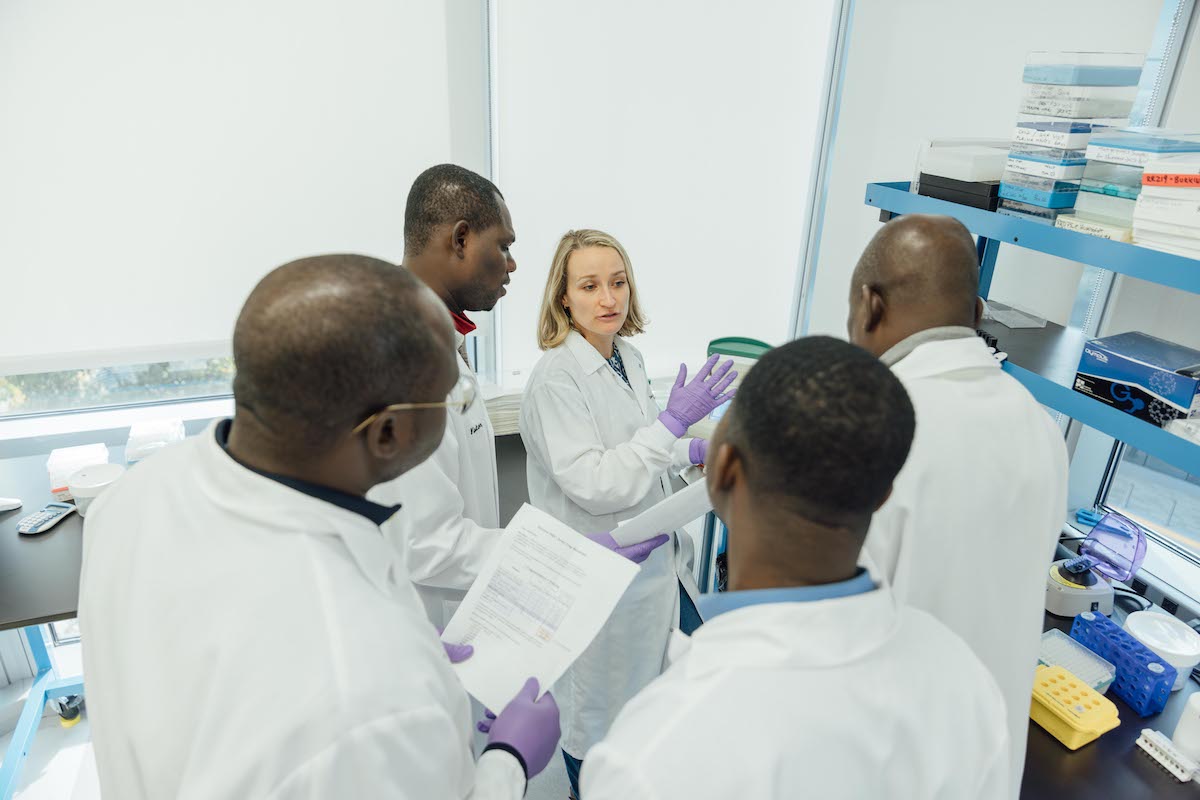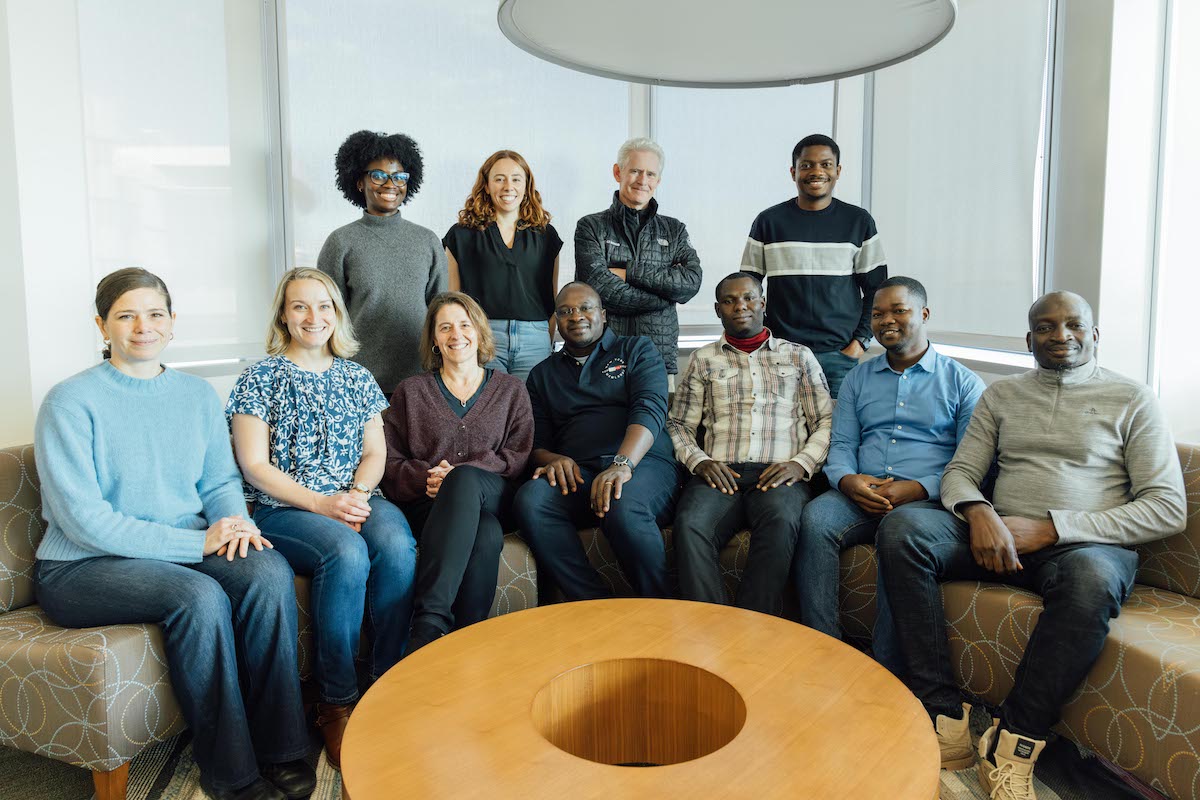A vaccine against dementia?
CZ Biohub San Francisco Investigator analyzes health record data to find evidence that a shingles vaccine can lower the chances of developing dementia
In 2023, the West African nation of Burkina Faso experienced a particularly deadly outbreak of dengue fever, a mosquito-borne viral infection that has been on the rise around the world. In the end, Burkina Faso would see more than 154,000 suspected cases and at least 700 deaths, making it Africa’s largest dengue epidemic ever.
One major factor hampering the ability of health authorities in Burkina Faso to respond to outbreaks like this is lack of access to diagnostic testing services. Typically, the vast majority of suspected fever cases there never receive any laboratory-based confirmation; among the ones that did in 2023, a surprisingly large number of suspect cases tested negative for dengue virus, raising concerns that additional pathogens might be contributing to the epidemic. Because dengue symptoms are difficult to distinguish from multiple other febrile illnesses that circulate widely in the region, improved testing capabilities for differential diagnosis can help improve case management of patients. As the outbreak in 2023 spread rapidly, the existing surveillance system attempted to ramp up testing services to monitor the spread, and authorities noted a very high degree of clinical severity.
“The authorities asked us to understand why this outbreak had such high mortality, but at that time we couldn’t do any dengue sequencing, so it was really a challenge for us to understand,” says Isidore Bonkoungou, a professor of microbiology and head of the Central Reference Laboratory under Burkina Faso’s Ministry of Health. “In order to have a rapid response to outbreaks, we needed capacity in metagenomics.”
Now, Burkina Faso is getting exactly that, thanks to an agreement between Chan Zuckerberg Biohub San Francisco and The Global Fund to Fight AIDS, Tuberculosis and Malaria to collaborate in the fight against new and re-emerging infectious diseases in low- and middle- income countries. In December, Bonkoungou and three colleagues from other reference labs in Burkina Faso traveled to San Francisco for hands-on training in metagenomic sequencing at the bench along with data analysis training that will allow them use sequencing data to better understand dengue dynamics in their country and inform their public health response.
“Post-COVID, public health jurisdictions around the world have realized that genomics is key to both detecting and responding to infectious disease outbreaks,” says Cristina Tato, an immunologist by training and senior director of the Rapid Response group at CZ Biohub SF. “The mission of our team is to bring genomics tools and technologies to low-resource settings. We’ve been doing that for seven years, and so far, we’ve worked in 28 countries to build capacity in metagenomics and genomic epidemiology.”
As agreed in the MOU with the Global Fund, an international partnership based in Geneva, the Biohub’s Rapid Response team will work with Global Fund grantees to provide training and strengthen their capacity for improved disease surveillance and response to infectious diseases. The Global Fund is a partnership between governments, civil society, the private sector, and people affected by diseases; it invests nearly $4 billion annually to support programs run by local experts in more than 140 countries.
“Before COVID, the Global Fund’s investments in genomics were limited. But the pandemic highlighted the relevance — and potential novel applications — of sequence data to inform disease control and outbreak response,” says Juliet Bryant, a Global Fund Medical Laboratory Specialist. “Recognizing the urgent need for sequencing capacity, the Global Fund supported countries in securing essential equipment. Now, our focus is shifting to empowering people: developing tailored training programs and fostering professional mentoring and collaborations among scientists, to build the specialized expertise required to run and manage core sequencing facilities.”
Metagenomic next-generation sequencing (mNGS) is an unbiased technique that allows practitioners to detect, identify, and characterize pathogens. For data analysis, the Biohub Rapid Response team uses CZ ID, a free no-code, cloud-based platform. “It’s basically a data science team in a box, in the cloud,” says CZ Biohub SF President Joe DeRisi. “It allows people to upload their sequence and get very sophisticated analyses in a very short amount of time that otherwise would not be available to them.”

CZ Biohub SF scientist Genay Pilarowski (center) trains researchers from Burkina Faso in sample preparation for metagenomic analysis. (Credit: Dale Ramos)
When the COVID pandemic hit, the country had no sequencing capacity. “When COVID arrived, no lab in Burkina Faso could do sequencing. Nigeria was the first to sequence our samples, but data transfer was a big issue,” says Kabore Regma, a molecular biologist with the Central Reference Lab. “Then we got sequencing machines, but we got no training and no reagents.”
But what COVID also brought was the realization that the country needed to build scientific capacity for infectious disease response. “COVID accelerated the opportunity for Africa to move to genomics and bioinformatics for public health,” says Bonkoungou.
Now the government is deeply committed to improving access to diagnostics and strengthening the surveillance system. In fact, Burkina Faso was the first country in western and central Africa to establish a Laboratory Directorate and has become a leader in infectious disease response in west Africa.
“Burkina Faso is developing a whole new national strategy for pathogen surveillance, bringing nine labs around the country online, but there are gaps in workforce training,” Tato says. “That’s where we can come in and help get that started. We’re excited to work with Global Fund to make this strategy a reality.”
The dengue virus has four distinct serotypes. Using mNGS, Burkina Faso hopes to answer questions such as: which serotype is most prevalent? How does clinical severity correlate with serotype? Were there co-infections? For example, chikungunya is also a mosquito-borne virus that can have similar symptoms as dengue.
“Besides dengue, we also got some chikungunya cases,” says Bonkoungou. “With sequencing we want to understand if there was a co-infection or co-outbreak.”
Burkina Faso also has plans to develop a wastewater surveillance system, and it wants to use mNGS to monitor avian flu, which is a serious concern since poultry production is a major source of income in the country.
The four Burkina Faso scientists recently spent two weeks in San Francisco, getting step-by-step instructions that they plan to share with colleagues back home.
“In genomics you can have generic training, and you can have your protocols, but there are some things you’d never put in a protocol. In this training we learned a lot, like how to troubleshoot. That’s very, very important, because you can work with the same protocol and never get the same result,” says Saidou Ouedraogo of the National Reference Laboratory for Viral Hemorrhagic Fevers. “In the lab you have to automate your workflow to get good results for analysis. I’m very happy with what I’ve learned here at Biohub.”
The scientists return to a country with ambitious plans for disease prevention. “Burkina Faso just launched our 7-1-7 initiative: that means less than 7 days to detect an outbreak, 1 day to notify health authorities, and 7 days to respond,” says Bonkoungou. “They’re counting on our lab to carry this out. There are big expectations from the national health minister from this training because they want us to have local capacity to face any outbreak.”
Regma feels up to the challenge: “Now we have the platform, and we have a clear vision of where to go,” he says.

Pictured are (back row, from left) Daniele Jones, Rebecca Gowen, Joe DeRisi, and Paul Oluniyi of Biohub SF; (front row, from left) Maira Phelps, Genay Pilarowski, and Cristina Tato of Biohub SF; Burkina Faso researchers Isidore Bonkoungou, Sombie Salif, Regma Kabore, and Saidou Ouedraogo. (Credit: Dale Ramos)
The Burkina Faso team is now back home, setting up its labs and implementing workflows that it learned in San Francisco. Tato and her team are looking forward to welcoming teams from other countries later this year.
What makes the Biohub’s Rapid Response group especially effective is that it has essentially built a global network consisting of previous training cohorts who continue to share information and ideas and stay up to date on emerging trends.
“It’s traditionally been a problem with global health, which is that people get training but don’t stay connected. That’s what makes our program different,” Tato says. “We stay with them for up to two years, and they have opportunities to connect with other groups.”
Tato and her team have worked with more than 30 lab groups in 28 countries throughout Africa, Asia, and South America, providing training in genomic epidemiology as well as metagenomics. (Read about the research goals of previous trainees from Bolivia and Malaysia.)
“The grand idea here is to reinforce this global surveillance network that we’re all striving for. Especially now in post-SARS-CoV-2 times, everyone is talking about: how are we going to generate more data? How are we going to communicate and be on better watch for the next pathogen that might cause a pandemic and prevent that pandemic?” says Tato. “And so what this does is it strengthens all of those groups that are on the front lines of disease surveillance, and allows them a way, in real time, to keep track of what’s happening in their regions, to help feed and strengthen the rest of that global surveillance network.”
CZ Biohub San Francisco Investigator analyzes health record data to find evidence that a shingles vaccine can lower the chances of developing dementia
Learn More
For CZ Biohub San Francisco research associate Rodrigo Baltazar-Nuñez, science is personal
Learn More
A conversation with Steve Quake, Amy Herr, and the Stellar Science Foundation’s Takanori Takebe
Learn More
Stay up-to-date on the latest news, publications, competitions, and stories from CZ Biohub.
Marketing cookies are required to access this form.